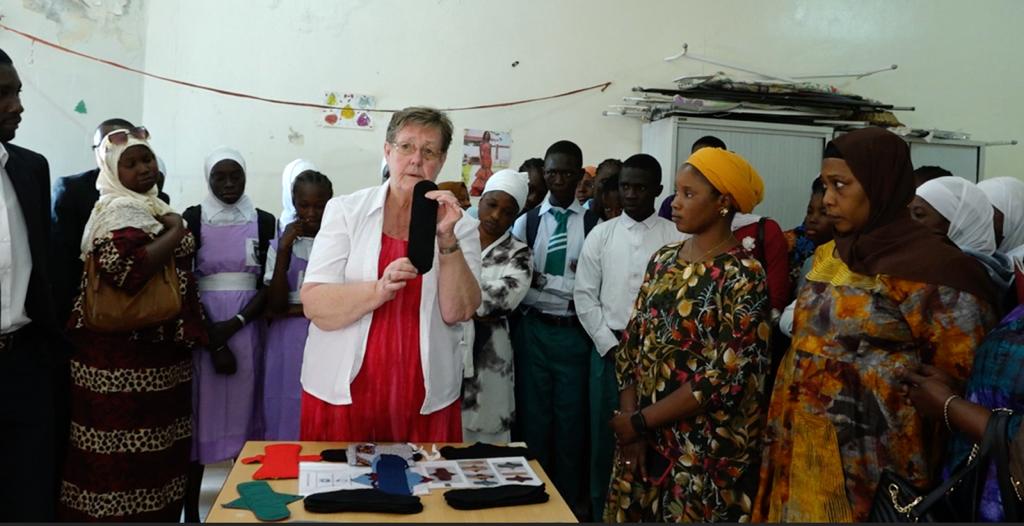Tallinding South WDC Launches Re-usable Menstrual Pads Project

BY Ramatoulie Jawo
The Ward Development Committee (WDC) of Tallinding South in association with partners on Wednesday, February 1, 2023, launched the re-usable Menstrual Pads Project at the Tallinding Community Youth Center.
The reusable menstrual pads were donated by the National Police Aid Charity through the Ebou Mala Children Charity foundation (EMCCF). The project aims to help young girls, and women, especially school-going girls, to end Menstrual period poverty in the Gambia.
The inauguration ceremony was presided over by the elected Councilor of the area, Hon. Karamo Ceesay.
Speaking at the event, the Principal Administrator of the Sendalira project, Amienata Gomez, highlighted the mission of the project.
“Our mission as an organization is to provide a more comfortable and sustainable option to the traditional pads that women use. We believe that their products are an important step in creating a better, healthy, and more sustainable future. With this project, we hope to drive passive importance on the environment and make a difference to those who need it. More especially the women and young girls,” she said.
The Chairperson of Ebou Mala Children Charity Foundation (EMCCF), Fatou Bah, described the project as “very timely” in tackling a global concern.
“The project is very timely in tackling some of the global concerns that we all have a responsibility to address together to achieve the UN Sustainable Development goals of 2030,” she said.
Madam Bah is optimistic that the project would be very “useful” to the students. However, she called on the government and other charitable organizations to join them in creating a solution to end period poverty in the Gambia.
The Chairperson of the National Police Aid Charity, Marion Tasker, said she discovered that in Africa, Young ladies suffered with their education and could not keep up with the boys due to the menstruation cycle, with young girls sometimes missing a week from school every month due to a lack of adequate protection during their menstrual period.
“This was the problem, that’s why we came and said we could try to help them. So, the idea of washable pads was formulated. So, I went back home and did more investigation and produced the designs and the fabric that we are using now.
“The big problem in Africa in many countries is commercial pads. They are very expensive or not available and if it is available, you have a problem disposing of them. Which is now causing problems all over the world. So now it is our wish to have washable sanitary pads to reduce a lot of issues,” she stated.
Madam Tasker added that they started their project initially in Zambia, and it proved to be remarkably successful and that is why they want to bring it to the Gambia as well.
Bakary B. Darboe, Manager Community Service (KMC), said they are happy to be associated with the “laudable” initiative.
“The project is very good, and we think it will go a long way in addressing the issues of menstrual pads that the girls usually use within. Because it has caused so many environmental issues, especially the one we use in the shop. The disposal is a problem and that alone has serious implications for our environment,” he said.
The representative from the Ministry of Health, Fatou Sanyang, talks about the importance of menstrual hygiene. She stated that the Reusable pads will be infection free and effective.
The Councilor of Tallinding South, Karamo Ceesay, said the re-useable pads project is launched for all communities in the Gambia, not only Tallinding because the idea is to support all the vulnerable women across the Gambia.
The onset of menstruation is one of the most important physiological changes occurring in girls during their adolescent years. Menstrual hygiene is a hygienic practice during menstruation that can prevent women from infection in the reproductive and urinary tract.
Meanwhile, Health experts revealed that poor menstrual hygiene can pose serious health risks, like reproductive and urinary tract infections, which can result in future infertility and birth complications.

